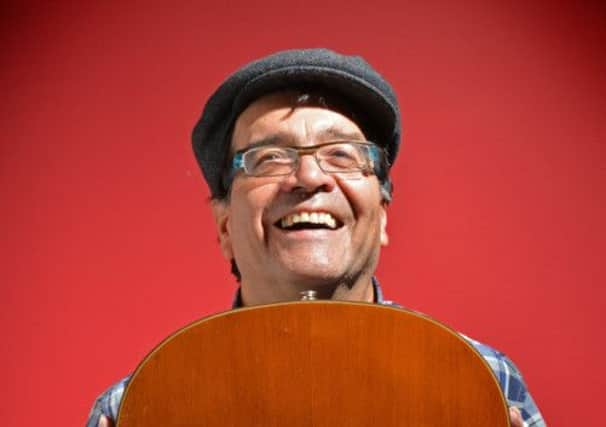Carlos Arredondo: Singing for lost friends


On 11 September 1973, Carlos Arredondo, a young worker in a Santiago guitar factory, became aware of explosions in the vicinity of the presidential palace, some 20 minutes away from his barrio, as military jets streaked through the sky. Lorries packed with soldiers started rumbling through the streets.
Arredondo was witnessing the military coup that ousted the constitutionally elected Chilean president, Salvador Allende. It ushered in an era of brutal repression under General Augusto Pinochet, which saw the internment, torture and murder of thousands while others simply disappeared and a million people fled into exile, more than 2,000 settling in the UK.
Advertisement
Hide AdArredondo became one of the exiles. A member of Juventud Obrera Catolica, a Catholic group for young workers which espoused liberation theology, he realised that he was at risk of arrest or much worse. “People could be detained without reason, just picked up off the street,” Arredondo, now 64, recalls from his Edinburgh home. Some of his friends in the JOC did disappear and he was later given grim accounts of their torture and murder.
Long established in Scotland as a singer-songwriter, Arredondo marks the 40th anniversary of those tumultuous events next Saturday with a concert in the hall of St John’s Church in Princes Street, Edinburgh, at which he will be joined on stage by the esteemed Scottish folk band, the Whistlebinkies, and fellow Chileno exile and guitarist Galo Ceron.
Back in 1973, at the invitation of friends in Peru, Arredondo found his way to Lima and, through the UN High Commissioner for Refugees, ended up on a plane to London. Consequently, in September 1974, he was one of a coachload of Chileans, some with young children, which rolled to a halt late at night outside the home of Mike Gonzalez, a lecturer in Latin-American Studies at Glasgow University and a founder member of the Chilean Solidarity Campaign.
Arredondo, with only a few words of English, used music to communicate, forming a folk group with other exiles, singing at Solidarity events – not least to workers at the Rolls-Royce plant at Hillington who refused to work on jet engines destined for the Chilean air force.
He fell in with sympathetic Scots folk performers such as Hamish Imlach, the Whistlebinkies and the Laggan, who also performed at Solidarity events. Since then he has remained what he calls “a cultural worker,” raising awareness of Latin America and singing his own often passionate songs as well as those of the Chilean singer, Victor Hara, who was tortured to death in the National Stadium in Santiago.
Arredondo’s frequent collaborator, Galo Ceron, is a classical guitarist specialising in South American composers and a former founder member of the band, Salsa Celtica, who arrived in Scotland at the age of eight. Ceron’s father, a health worker and trade union member, had been interned on Dawson Island in Tierra del Fuego. He was released because of insufficient evidence, but life in Chile remained too dangerous, so they spent three years in Argentina before arriving in Dundee at the end of 1977. Like Arredondo, Galo found that music helped demolish communication barriers, and he ended up studying classical guitar at the RSAMD (now the Royal Conservatoire of Scotland). “I have a Chinese friend who used to say, ‘Made in China, assembled in Scotland,’” he laughs. “I feel just the same.”
Advertisement
Hide AdThe concert at St John’s is one of numerous events being held under the auspices of the umbrella organisation, Chile 40 Years On. American singing legend Peggy Seeger appears, with Arredondo and others, in a Justice for Victor Jara concert in St Andrews in the Square, Glasgow, on 16 September, while the Edinburgh Filmhouse holds a day of Chilean films on Wednesday. In Glasgow, on 14 September, there will be a Scottish Trade Union Congress exhibition, film screening and cultural evening in Woodlands Road, Glasgow.
Meanwhile at Leith Library, from 9-20 September, an exhibition, Jan’s Papers, will display a unique cache of Chilean newspapers from the days of the coup, presented to Arredondo by his friend, the late musicologist, Jan Fairley, who was living in Chile at the time. And at Summerhall in Edinburgh, there is an exhibition of posters banned during the coup.
Advertisement
Hide AdForty years on, Arredondo regards Scotland as home. “I am very happy here, but how can I live in peace when six of my best friends were murdered in the worst possible manner? I have to do something on their behalf to ensure our history is remembered.”
Mike Gonzalez, now emeritus professor of Latin-American Studies at Glasgow University and a speaker at next Saturday’s concert, sees salutary lessons in the events of September 1973: “Forty years on, we are looking at Syria and other examples of how, when progressive regimes emerge which are threatening to powerful vested interests, those vested interests can respond with great violence.”
At a time when immigrants and asylum seekers are frequently demonised, he recalls the night that coach full of displaced Chileans halted outside his home. “Here was an example of a different Britain, not one governed by racism and xenophobia, in which genuine refugees from a terrible situation were welcomed with open arms.”
For further details of events, see www.chile40yearson.org and www.carlosarredondo.com